
Life on land
Green cover is vital for sustaining life on Earth, as it provides essential ecosystem services such as oxygen generation, carbon sequestration, water cycle regulation, and habitats for a wide range of species. However, anthropogenic activities like deforestation, poaching, and forest fires threaten this ecological balance, leading to profound environmental and socio-economic repercussions. Institutions of higher education, such as Nitte (Deemed to be University), play a pivotal role in forest conservation, sustainable ecosystem management, and combating desertification, thereby contributing meaningfully to the achievement of the United Nations Sustainable Development Goals (SDGs).
Universities are central to the advancement of the SDGs through their commitment to environmental education, scientific research, and community-oriented conservation initiatives. Nitte (Deemed to be University) exemplifies how academic institutions can assume leadership in environmental stewardship while actively engaging their communities in sustainability efforts. Through awareness programs targeting students, faculty, and the broader public, universities can foster a culture of environmental responsibility and inspire collective action towards a sustainable future.
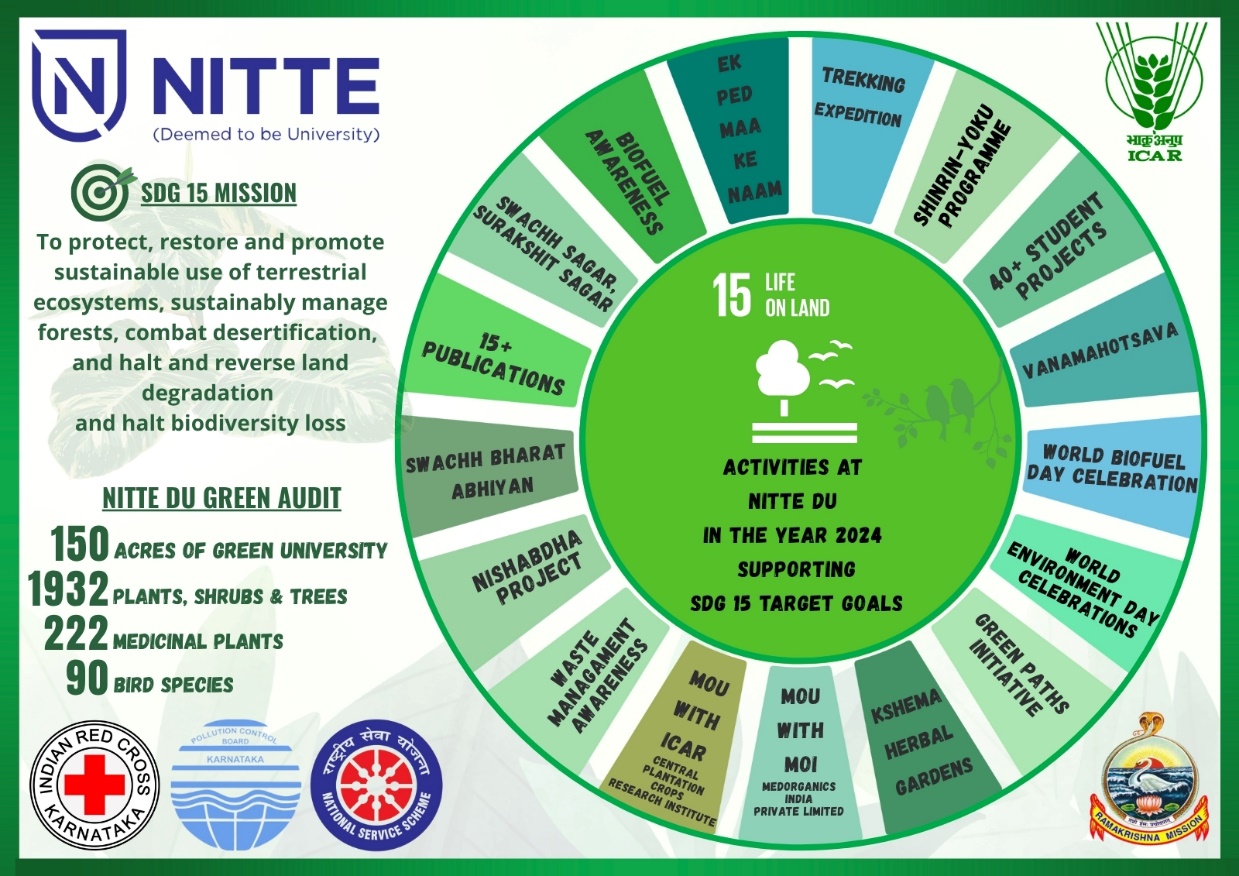
Proactive steps taken by NU
Nitte (Deemed to be University): Sustainable Campus Development and Green Initiatives
As part of its commitment to sustainable campus development, Nitte (Deemed to be University) established the Nitte University Green Initiative Project (NUGIP) on May 30, 2017. The project is guided by a committee chaired by the Honourable Vice-Chancellor and comprises members including the Registrar, Heads of Institutions (HOIs), NSS Officers, Purchase Officer, Estate Manager, faculty representatives from constituent institutions, and external experts such as environmental officers and environmentalists. The committee functions under the aegis of NUGIP and coordinates with NSS units, faculty, and students to implement a range of ecosystem conservation efforts. These include outreach programs, Vruksha Bandhan, tree planting on birthdays, Vanamahotsava celebrations, Swachh Bharat initiatives, environmental awareness campaigns, nature camps, Ayurveda-related field visits, and tree adoption drives, among other activities.
“Plant a Tree on Your Birthday” Initiative
The "Plant a Tree on Your Birthday" initiative, launched by NUGIP at the KSHEMA campus, encourages faculty members to commemorate their birthdays by planting a sapling. This thoughtful and environmentally conscious practice not only fosters a personal connection to nature but also contributes to enhancing the biodiversity of the campus. Each sapling planted becomes a living memory and a symbol of sustainability. Regular plantation drives are organized to promote a clean and green campus, and the committee’s recommendations are duly integrated into the University's developmental planning.
Environmental Monitoring and Sustainability Measures
To ensure the availability of clean air and water, the University campus undergoes periodic environmental monitoring. Air and water quality assessments are conducted by an independent agency and are subject to validation. The results consistently fall within permissible environmental limits, reflecting the University's dedication to maintaining a healthy and sustainable living environment.
Indoor Plants and Institutional Initiatives
While indoor plants are not directly a part of terrestrial ecosystems, they serve as constant visual reminders of the significance of plant life and biodiversity. At A.B. Shetty Memorial Institute of Dental Sciences - where outdoor green cover is relatively limited—efforts have been made to improve indoor air quality. Common areas are enhanced with well-maintained indoor plants, which contribute to oxygen generation and carbon dioxide reduction. Through such measures, the institute actively promotes the concept of a “Clean City, Green City.”
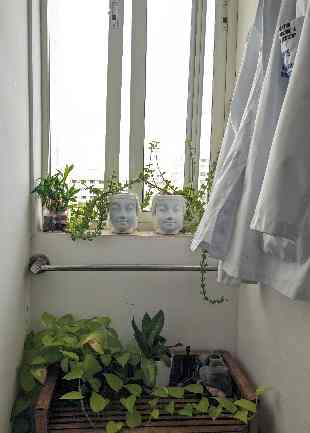
Flora, Fauna, and Ecological Mapping of the Campus
The Nitte University campus, spread across four distinct sites encompassing a total of 150.49 acres, supports a rich variety of flora and fauna. A dedicated biodiversity survey has recorded 90 species of birds on campus, with data submitted to eBird.org, a global bird-monitoring platform maintained by The Cornell Lab of Ornithology, Ithaca, NY. The campus is also home to approximately 1,605 herbal plants, woody shrubs, and trees - a result of continuous afforestation and greening efforts. A comprehensive tree audit was conducted over a six-month period, during which Geographic Information System (GIS) tagging of all trees on campus was undertaken. The University's emphasis on native and indigenous plant species is evident in the high representation of local trees, reinforcing its commitment to biodiversity and ecological preservation.
Nitte (Deemed to be University) is committed to creating and maintaining an environmentally conscious and sustainable campus across all its locations. Each campus site integrates green infrastructure, biodiversity conservation, and ecological planning in alignment with national and global sustainability goals.
- University Administration and Hospital Campus
The University administration and hospital campus is designed with aesthetic and ecological sensibility. It features a well-maintained garden adorned with flowering trees, expansive lawns, and water fountains that create a serene environment. A quaint temple situated at the entrance houses a rose garden that contributes to the visual appeal and cheerfulness of the surroundings. Stone benches along the pathways provide resting spots beneath floral canopies, allowing visitors and staff to enjoy the tranquillity of the water features and garden landscapes.
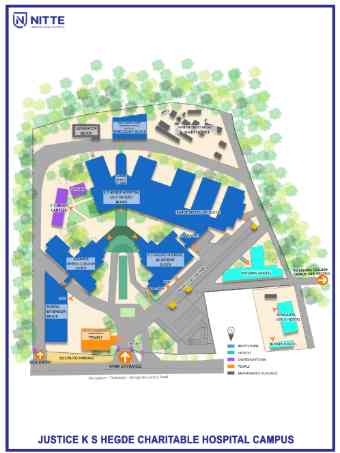
- Paneer Campus
Located away from urban congestion, the Paneer Campus hosts the Nitte Gulabi Shetty Memorial Institute of Pharmaceutical Sciences, Nitte University Centre for Science Education and Research, Nitte Institute of Architecture, Nitte Institute of Communication, and Nitte Usha Institute of Nursing Sciences. The architecture incorporates sky-lit open spaces to maximize natural light within buildings.
The campus includes a football-ground-sized lawn to support student recreational and sports activities. It also maintains two well-curated herbal gardens showcasing native medicinal plant species. Supporting infrastructure includes the girls' hostel, a centralized kitchen, and a Sewage Treatment Plant (STP). The green cover extends over 24% of the campus, comprising 725 trees and woody shrubs.
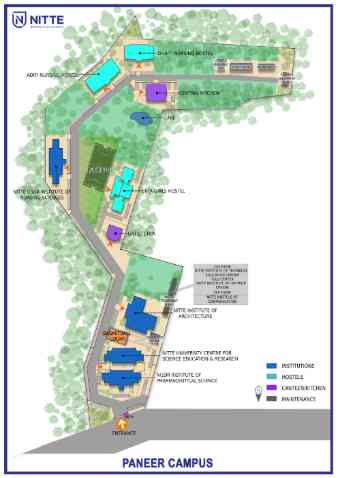
- KSHEMA Campus and Hostels
The KSHEMA campus is home to the K.S. Hegde Medical Academy and the Nitte Institute of Physiotherapy. It also features separate hostels for male and female students, as well as a well-equipped gymnasium. The campus buildings are designed with spacious internal quadrangles that allow the flow of natural air and light, and include aesthetically designed indoor gardens to enhance the ambience.
A football ground supports regular sports activities, while tree-lined avenues of native flowering species attract a rich population of birds and butterflies. Additionally, a medicinal garden houses a variety of trees and herbs used in traditional medicine. The green cover spans 24.3% of the campus and includes 939 trees and woody shrubs.
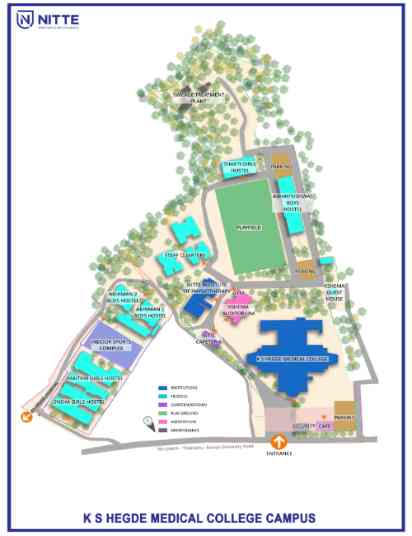
- New Nitte University Campus
India, as a signatory to the Paris Agreement (2015), has committed to reducing greenhouse gas emissions by 30–35% below the 2005 emission intensity of its GDP by the year 2030. In alignment with this national commitment and the eight missions outlined under the National Action Plan on Climate Change (NAPCC), the master planning of the Nitte University campus integrates several key environmental principles. These include microclimate modification, efficient water cycle management, adoption of clean energy solutions, and the enhancement of ecological and biodiversity systems.
These strategies are implemented within a structured framework of dedicated ecological zones - namely, bio-conservation islands, forest corridors, riparian buffers, and deep-water ecosystems. The purpose of these ecological niches is to protect, enrich, and sustain a diverse natural habitat that contributes meaningfully to both regional and global carbon sequestration efforts. This approach underscores the University's commitment to fostering an environmentally resilient and sustainable campus ecosystem.
Nitte (DU) Green Audit and Biodiversity Assessment
A biodiversity assessment conducted across Nitte (DU) campuses revealed significant ecological diversity:
- In 2020, a survey documented 93 bird species, leading to the publication of a field guide featuring QR codes linked to their calls.
- The presence of nine butterfly species reflects a healthy, plant-diverse habitat.
- Nine frog species have been identified in undisturbed, vegetation-rich campus zones, indicating a thriving amphibian population.
- The University maintains approximately 1,932 herbal plants, shrubs, and trees, including several local and endemic species.
- Plantation drives emphasize the conservation and beautification of campus zones with flowering and fruit-bearing trees.

KSHEMA Herbal Garden/Medicinal Gardens
Medicinal plant conservation is an important component of the University's green initiatives. Both the KSHEMA and Paneer campuses maintain dedicated medicinal gardens. A total of 222 medicinal plant species has been cultivated, scientifically catalogued with details including botanical name, common name, known medicinal properties, and key chemical constituents. A book titled “KSHEMA HERBAL GARDEN” was also published to document these 222 plants which have been cultivated in K.S. Hegde Medical Academy campus. Few of the plants have been studied scientifically for their medicinal value at the Central Research laboratory of the University. The anti-oxidant and radio-protective properties are also being assessed using animal models with a support of Board of Research in Nuclear Sciences (BRNS) Govt. of India. This multi-campus approach to green infrastructure, ecological balance, and sustainable planning reflects Nitte (DU)’s commitment to environmental stewardship and its role as a responsible higher education institution.
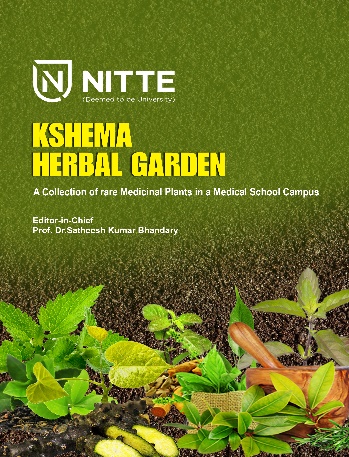
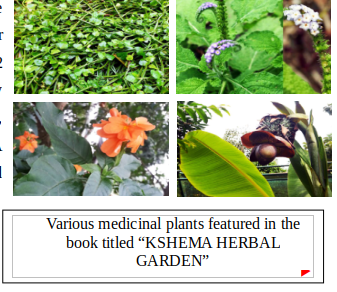
Policy on plastic waste reduction
Nitte (Deemed to be University) is firmly committed to the principles of reducing, reusing, and recycling plastic waste as part of its overarching sustainability agenda. The University has instituted a range of initiatives and strategic policies designed to curtail, and where feasible, eliminate the use of plastic materials across its campuses.
While acknowledging the widespread dependence on plastic in everyday activities and the inherent challenges of achieving a completely “zero plastic” environment, the University is resolute in its efforts to significantly reduce plastic consumption and its associated environmental impact.
The University’s Plastic Waste Reduction Policy specifically focuses on the phasing out of single-use plastics and other non-biodegradable materials. The objective is to mitigate environmental pollution and advance sustainable practices. These measures are embedded into campus operations and are supported by awareness campaigns and community engagement activities, fostering a culture of environmental responsibility among students, faculty, and staff (http://nitte.edu.in/naac/2023/THE_IMPACT/Policies/plastic_Waste_policy.pdf ).
Water discharge guidelines and standards
Nitte (Deemed to be University) consumes approximately 7.67 lakh litres of water daily across its campuses, with around 60% used by the hospital. Of this, nearly 5.59 lakh litres per day is generated as wastewater. A significant portion is already treated and reused for non-potable purposes such as toilet flushing through dual pipeline systems, as well as for gardening and landscaping.
In line with government directives and the University’s environmental policy, further measures are being implemented to collect and treat all forms of wastewater for use in irrigation, toilet flushing, cooling systems, and other non-potable applications. This initiative reflects the University’s commitment to sustainable resource management.
Mangalore's erratic rainfall, declining groundwater levels, and limited availability of surface water have led to increased pressure on existing water sources, particularly in the context of rising patient loads and student admissions. As nearly 80% of the consumed water returns to the sewer system, the safe and efficient reuse of treated wastewater presents a viable solution to reduce dependency on freshwater resources.
As a socially responsible higher education institution, NitteDU is adopting a comprehensive Water Recycling Policy to address these challenges. The policy not only mitigates environmental impact but also ensures the long-term sustainability of campus operations by promoting responsible and efficient water usage (https://nitte.edu.in/naac/2019/policies/NU_TreatedWasteWateReuse_R0.pdf ).
Programmes conducted
Swachh Bharat Abhiyan/Swachh Bharat Shramadan/Cleanliness drives
Nitte Institute of Physiotherapy and Ramakrishna Mission Swachh Mangaluru Abhiyan, led their monthly cleanliness drives on 11th February 2024, at the Service Bus stand, State Bank and on 10th March 2024, at Head Post office, Rosario School Road, Mangaluru. 38 students participated in the drives. A Plogging Drive was also organised by the NSS unit of Nitte Institute of Physiotherapy on 5th June 2024 wherein 120 students and the faculty of NIPT actively participated in the social event. More than 40 bags of plastic waste were collected between KSHEMA to Deralakatte Junction, after the massive cleaning drive, ensuring a clean surrounding. The Swachh Sena Unit of Nitte Institute of Physiotherapy, participated in the Swachh Bharat Shramadan event at Kottara Chowki, Mangaluru on 9th June 2024 and at Mangalajyothi Integrated Special School, Vamanjoor on 11th August 2024. The team diligently worked to clear litter, remove debris and ensure the area was thoroughly cleaned. On the occasion of World Physiotherapy Day, the Nitte Institute of Physiotherapy organized the Swachh Sagar Abhiyan in collaboration with the Ramakrishna Mission, Mangaluru, at Tannirbhavi Beach on 8th September 2024. Approximately 500 students and volunteers participated in cleaning the beach. Nitte Institute of Physiotherapy (NIPT) also conducted a “Service to the Sacred” Swachhata Drive at ISKCON Kulai, Mangaluru, on 27th October 2024, wherein 108 participants including faculty and students actively participated in the initiative to carry out the cleanliness drive, focusing on the temple surroundings, library, kitchen and storage areas.
As a part of the World Health Day celebrations, NUCSER’s NSS unit conducted a campus cleaning drive on 16th March 2024. Plastic and other garbage that were not environment friendly were discarded in separate garbage bags. The activity was conducted in line with the theme for the year “My health, my right”. The NSS Wing of NUCSER also participated in the mega event “Swachh Sagar, Surakshit Sagar - 2024” on Gandhi Jayanthi day, 2nd October 2024, as part of the Swachhta Hi Seva initiative.
The PG Diploma students of NICO and the NSS and Youth Red Cross units of NGSM Institute of Pharmaceutical Sciences participated in the clean-up drive that was held on 12th January 2024 at the Tree Park, Tannirbavi Beach, to celebrate the National Youth Day 2024 to commemorate the 162nd birth anniversary of Swami Vivekananda. With great enthusiasm, students collected plastic and e-waste found on the beach.
The NSS Unit of Nitte Usha Institute of Nursing Sciences, in collaboration with the Ministry of Youth Affairs & Sports, Government of India, Regional Directorate of NSS, Bengaluru conducted a Swachhata campaign on the occasion of Shaheedi Diwas on 5th April 2024, at Paneer campus. A total of 42 first-year GNM NSS volunteers actively participated in the Swachhata campaign.
Dr. MRSM School celebrated Gandhi Jayanti on 2nd October 2024 by participating in a cleanliness drive, ‘Shramadhan', cleaning the school premises for half an hour. The staff members and NSS students of NRAM Polytechnic also celebrated the Gandhi Jayanti by participating in the Swachha Bharat Abhiyan on 2nd October 2024. During the event, they pledged to dedicate at least 100 hours each year to cleanliness activities. Following the oath, they actively engaged in cleaning the public area from Nitte Kemmannu Dwara to the Masjid in Nitte.
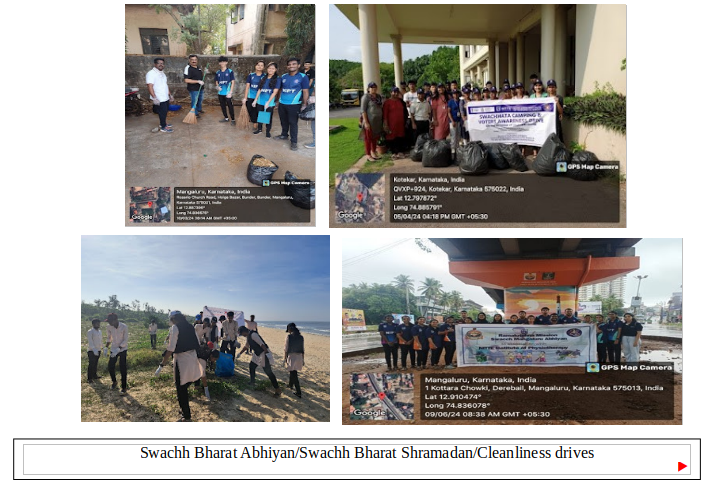
ICMR-funded Clinical Training on ‘Management of Biomedical Waste’
Nitte Usha Institute of Nursing Sciences in collaboration with Justice KS Hegde Charitable Hospital organized the valedictory program of the ICMR-funded Clinical Training on ‘Management of Biomedical Waste’ on 29th January 2024. The Chief Guest Prof. Dr. Harsha Halahalli, Registrar, Nitte University emphasized the importance of the management of Biomedical Waste and its practice in a hospital setting. The resource person Mrs. Sabitha Bulla Pinto shared her experience about the training program. The training program benefitted a total of 300 staff nurses.
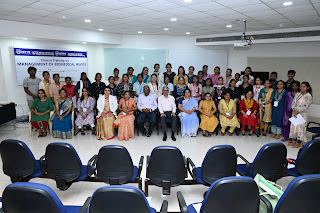
Biofuel Awareness Initiative
The Department of Biotechnology Engineering, NMAMIT organized a Biofuel Awareness program for the staff and students of Christ King PU College, Karkala on 14th March 2024. A total of 187 students along with 6 faculty members attended this session in different batches. Dr. Santhosh Poojary, Assistant Professor addressed the students and the faculty regarding the importance of biofuel and its production using various non-edible seeds and used cooking oil. The students were briefed about the equipments in the Biofuel Center by the volunteers.
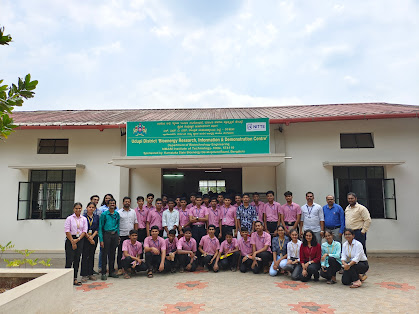
Biofuel Awareness Initiative organised by the Department of Biotechnology Engineering, NMAMIT
Memorandum of Understanding
NUCSER Signs MoU for Herbal Plant Biodiversity Assessment and with ICAR - Central Plantation Crops Research Institute, Kerala
NUCSER signed a Memorandum of Understanding (MoU) with Medorganics India Private Limited (MOI), a division of Meditek India on the 17th of February 2024. MOI is a state-of-the-art facility, manufacturing Ayurvedic, Herbal and Nutritional products located at Baikampady Industrial Area, Mangaluru (Karnataka). The MoU addresses the mutual desire to promote qualitative academic (education and research) and scientific exchange, joint activities, visits and internships among researchers and students.
NUCSER also signed a Memorandum of Understanding with ICAR-CPCRI on 8th March, 2024 to work on collaborative research projects pertaining to development of diagnostic tools for the detection of yellow leaf disease in areca. The signing event was held at NUCSER premises in the presence of scientists from NUCSER and CPCRI.
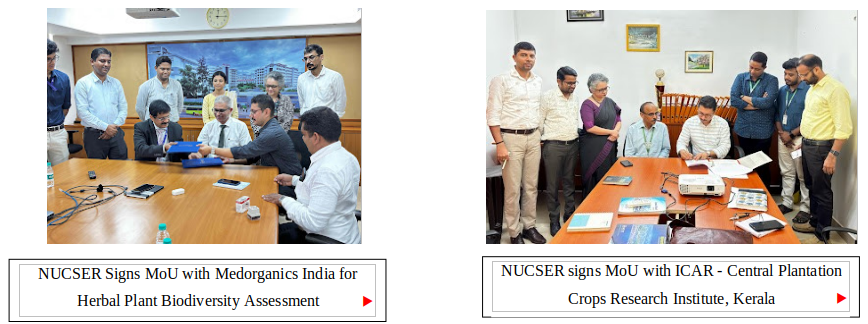
Nishabdha Project
The Department of ENT in association with MRPL Mangalore, conducted awareness programs on ‘Noise Pollution and Noise induced hearing loss’ for the school children at the following schools: Delhi Public School, (MRPL) Surathkal on 8th April 2024 for 126 students, St. Sebastin School, Permannur on 14th June 2024 for 201 students, St. Joseph Joyland High School, Kolya on 14th June 2024 for 240 students, Kunil School, Natekal on 21st June 2024 for 334 students, Assissi Central School, Deralakatte on 27th June 2024 for 252 students, Shakthi Residential School, Shakthi Nagar on 24th July 2024 for 480 students, Heera International School, Shakthi Nagar on 24th July 2024 for 50 students.
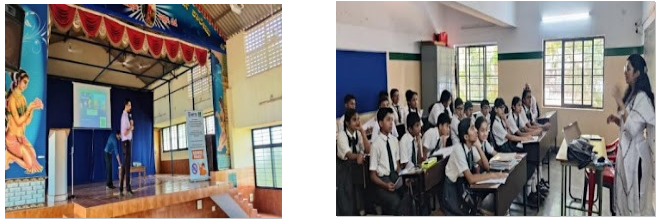
Trekking Expedition/Green Paths Initiative
The Green Paths Initiative, organized by Ni-Eco, the Environment Club of NICO, in collaboration with the NSS Unit of NICO on 18th May 2024 saw 30 enthusiastic participants embarking on a trek near Berkala falls, Hebri Taluk. Led by educator & environmentalist Ram Ajekar, the trek provided an opportunity for students to immerse themselves in nature and learn about biodiversity and conservation efforts. The initiative saw active participation from students of I year BA as this exercise was a part of their studies in Environment and Development Communication. During the trek, participants interacted with forest dweller Bojanna Gowda, gaining insights into local customs, cultures and ways of life. Through tree plantation exercises and discussions, students not only gained insights into environmental issues but also cultivated a sense of responsibility towards the environment.

Nishabdha Project – Awareness programme on Noise Pollution and Noise induced hearing loss
World Environment Day/Vanamahotsava/Ek Ped Maa Ke Naam
Dr. MRSM English Medium School observed the World Environment Day on 8th June 2024. Mr. Balakrishna, Engineer, MRPL and PTA Secretary was the chief guest. He presented video clips on environment related problems such as plastic management, soil conservation and water conservation and listed the strategies that could help to dispose plastic in a proper way. Rain harvesting techniques were also discussed. Saplings were planted in the school premises as part of the Vanamahotsava celebrations on account of the World Environment Day. The NSS unit of KS Hegde Medical Academy also organized the celebration of Vanamahotsava as a part of World Environment Day under the initiative of 'Ek Ped Maa Ke Naam' on 3rd July 2024. NSS Program Officers and Volunteers of Green Brigade from KSHEMA participated in this tree plantation drive organized in the campus. NUCSER also celebrated the Vanamahotsava by planting saplings generated through plant tissue culture techniques on 20th July 2024. About 30 staff members and students participated in planting the saplings.
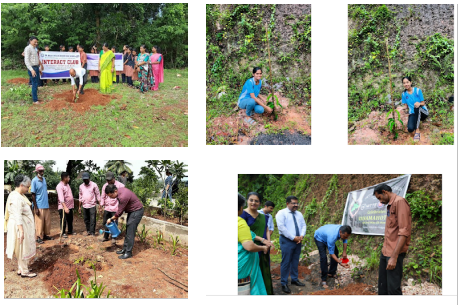
The Green Paths Initiative – Trekking expedition
World Biofuel Day Celebration
Nitte University celebrated World Biofuel Day on 12th August 2024 by planting biofuel saplings to mark the occasion. The sapling plantation was carried out by both staff and students.
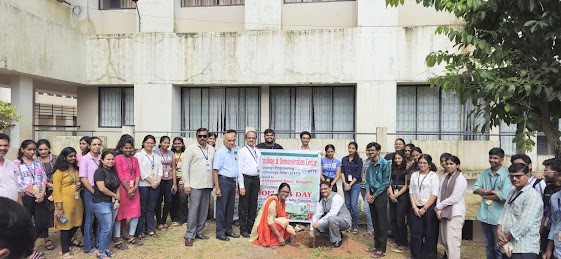
World biofuel day celebration
Talk on Waste Management
The NSS Wing of NUCSER successfully hosted an Interaction Day on 4th October 2024, focusing on the vital topic of Waste Management, to educate students on the importance of sustainable waste management practices and to understand their role in protecting the environment. The chief guest, Mr. Vikram, Health Inspector, Kotekar Pattana Panchayat provided a valuable session on waste management, discussing waste handling methods, segregation practices and the importance of reducing waste.
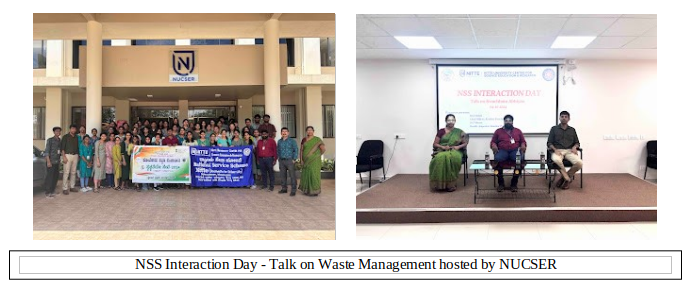
Shinrin-yoku Program
The National Service Scheme (NSS) Unit, Nitte Institute of Professional Education (NIPE), in collaboration with the Lions Club, Mangaluru organized the NIPE Shinrin-yoku program aimed at planting drought-resistant saplings on 29th October 2024 at the campus. Mr. P Krishnappa, a renowned environmentalist and DK District Rajyotsava Award Winner of 2022 was the chief guest. He stressed on the importance of sustainable planting practices and environmental conservation and shared his personal experiences & knowledge in the field, inspiring students to actively participate in sustainable initiatives. Drought-resistant saplings that included Neem, Java, Jack Fruit, Teak Plant, Ramphal & wild Jack were planted in the campus. The event reinforced the importance of adopting sustainable practices and marked a step towards building an eco-friendly campus.

Educational Visit to Wastewater Treatment Plant
As part of their academic curriculum, the postgraduates of Microbiology and Biotechnology visited a wastewater treatment plant located at Mullakad, Kavoor on 28th November 2024. Ms. Nisha, staff member of the plant, provided a detailed explanation of the wastewater treatment process using a model to illustrate the workflow. Mr. Harish, Technical Assistant, guided the students through the entire primary & secondary treatment processes, offering insights into their practical operation. The tertiary treatment plant, situated adjacent to the main facility, was explained by Mr. Rakshith, who elaborated on advanced treatment methods used for water purification and environmental compliance. Students gained a comprehensive understanding of municipal wastewater treatment processes; operational aspects of the plant and environmental regulations associated with these operations.
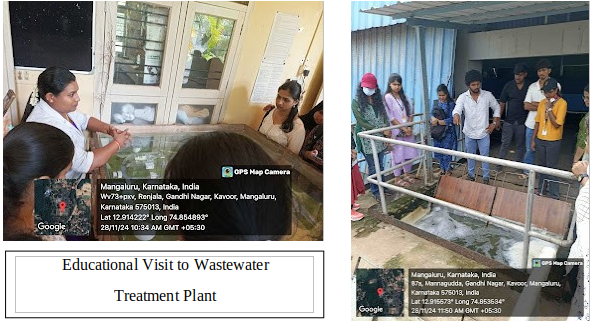


.png)